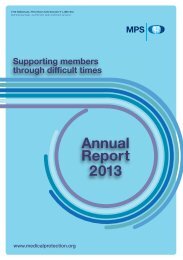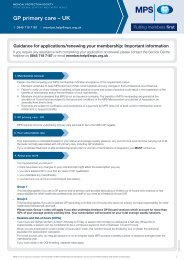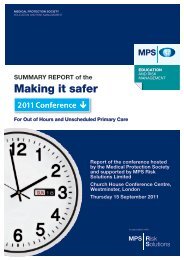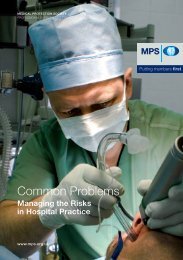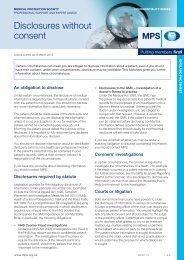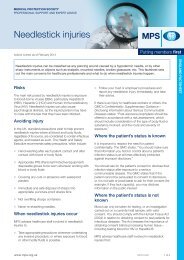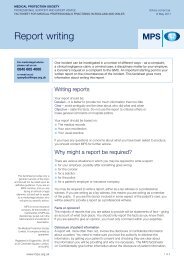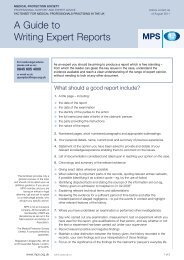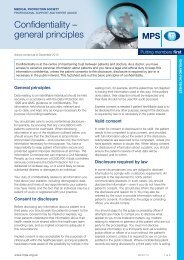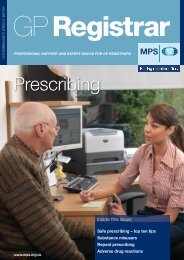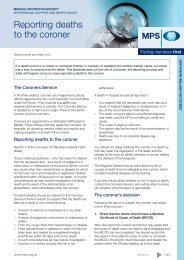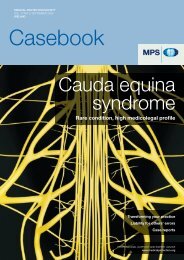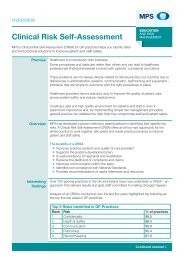Dr Rob Hendry - Medical Protection Society
Dr Rob Hendry - Medical Protection Society
Dr Rob Hendry - Medical Protection Society
You also want an ePaper? Increase the reach of your titles
YUMPU automatically turns print PDFs into web optimized ePapers that Google loves.
20<br />
CASE REPORTS GENERAL PRACTICE DIAGNOSIS/INTERVENTION AND MANAGEMENT<br />
UNITED KINGDOM CASEBOOK | VOLUME 19 | ISSUE 1 | JANUARY 2011 www.mps.org.uk<br />
Cuts and bruises<br />
Mrs S was a 65-yearold<br />
lady who had<br />
been suffering with<br />
stress incontinence and the<br />
discomfort of prolapse. She<br />
had a busy life looking after<br />
her three grandchildren and<br />
was finding her symptoms<br />
were interfering with this.<br />
She was admitted by her<br />
gynaecologist, Mrs V, for<br />
a vaginal hysterectomy,<br />
anterior and posterior vaginal<br />
repair and a colpopexy.<br />
The procedure appeared<br />
uneventful and Mrs V<br />
explained to Mrs S that the<br />
surgery should relieve her of<br />
her symptoms successfully.<br />
The next day, one of the<br />
junior surgical team noticed<br />
that Mrs S had a large bruise<br />
on her right buttock. This<br />
was discussed with the<br />
team and it was thought<br />
that this was caused due<br />
to her position on the<br />
operating table. Mrs S was<br />
reassured by this explanation<br />
and was discharged from<br />
hospital five days later.<br />
Three days later, Mrs S<br />
began to feel unwell. She<br />
felt feverish and had rigors<br />
that frightened her. She<br />
also developed diarrhoea<br />
and some yellow vaginal<br />
discharge. She felt so<br />
unwell that she requested<br />
a home visit from <strong>Dr</strong> W,<br />
her GP. There was very<br />
minimal documentation in<br />
<strong>Dr</strong> W’s notes about this visit<br />
except that he started some<br />
antibiotics and that he had<br />
noticed a bruise extending<br />
from her buttock to her knee.<br />
In particular, there was no<br />
documentation of her vital<br />
signs such as temperature,<br />
pulse or blood pressure and<br />
no written evidence of an<br />
abdominal examination.<br />
Over the next two weeks,<br />
Mrs S became increasingly<br />
concerned. She remained<br />
feverish and was finding it<br />
harder to walk because of<br />
pain in her right buttock and<br />
abdomen and swelling in her<br />
right leg. By the second week<br />
she was hardly able to walk<br />
at all and felt very unwell.<br />
She was visited at home by<br />
three different GPs from her<br />
practice. Each of the GPs<br />
noted the bruise that seemed<br />
to be extending down her leg<br />
but, again, did not document<br />
much else about her<br />
examination. The antibiotics<br />
were changed three times.<br />
When the bruising and<br />
swelling in her leg continued<br />
to worsen, one of the GPs<br />
discussed her case with the<br />
on-call gynaecologist over<br />
the phone. The gynaecologist<br />
thought Mrs S may have a<br />
DVT and suggested she go<br />
to the emergency department<br />
(ED) rather than to the<br />
gynaecology ward. When<br />
Mrs S arrived, she went to<br />
the medical assessment unit.<br />
The medics assessed her,<br />
but the on-call gynaecologist<br />
did not. She spent two days<br />
in hospital and, although<br />
an ultrasound scan failed to<br />
show a DVT, she became<br />
increasingly unwell.<br />
On the second day her<br />
temperature was spiking,<br />
her pulse was raised and her<br />
BP was running low. She<br />
was referred to the surgical<br />
ward, where she underwent<br />
an urgent CT scan,<br />
followed by a laparotomy.<br />
An extensive necrotising<br />
infection between the sacrum<br />
and rectum, extending<br />
into the right ischiorectal<br />
fossa, and multiple abscess<br />
tracks were found. Mrs S<br />
spent three months on the<br />
surgical ward undergoing<br />
extensive surgical treatment,<br />
including a loop sigmoid<br />
colostomy and recurrent<br />
debridement of the leg.<br />
Mrs S was traumatised<br />
by her long stay in hospital,<br />
the discomfort of all the<br />
surgery and with having to<br />
come to terms with having a<br />
colostomy. She made a claim<br />
against Mrs V and the three<br />
GPs who visited her at home.<br />
EXPERT OPINION<br />
Experts agreed that Mrs V<br />
did not take enough care,<br />
by performing a rectal<br />
examination, to ensure that<br />
the rectum had not been<br />
perforated by a suture<br />
during the posterior repair.<br />
LEARNING POINTS<br />
The GPs were criticised<br />
on several points. Firstly,<br />
it was felt that they had<br />
failed to consider a<br />
serious bacterial infection<br />
relating to Mrs S’s recent<br />
surgery. There was no<br />
documentation of her<br />
vital signs to assess<br />
the fever and severity<br />
of her condition.<br />
Secondly, it was felt that<br />
they failed to adequately<br />
examine the bruising and<br />
swelling to the right buttock<br />
and leg. Lastly, it was felt<br />
that they had failed to<br />
arrange admission and<br />
investigation earlier. The<br />
on-call gynaecologist was<br />
also criticised for failing<br />
to assess the patient as<br />
requested and therefore<br />
delaying her care for 48<br />
hours. The claim was<br />
settled for a substantial<br />
sum, divided between the<br />
hospital and the GPs.<br />
AF<br />
■ A diagnosis made by colleagues can always be<br />
challenged in the face of continuing symptoms. The<br />
three different GPs who saw Mrs S simply relied<br />
on each other’s opinion rather than seeking a new<br />
diagnosis.<br />
■ The GPs were criticised not for failing to diagnose<br />
her, but for failing to realise how ill she was and<br />
organise a timely admission. There was no<br />
documentation of her vital signs that could have<br />
illustrated the severity of her illness.<br />
■ Recent past medical history is likely to be relevant. It<br />
should be documented and considered.<br />
■ When there are post-surgical complications, the<br />
standard of aftercare is extremely important.<br />
■ This case highlights the importance of acting when<br />
a patient is deteriorating or failing to improve despite<br />
the working diagnosis and treatment.<br />
DR P. MARAZZI / SCIENCE PHOTO LIBRARY



